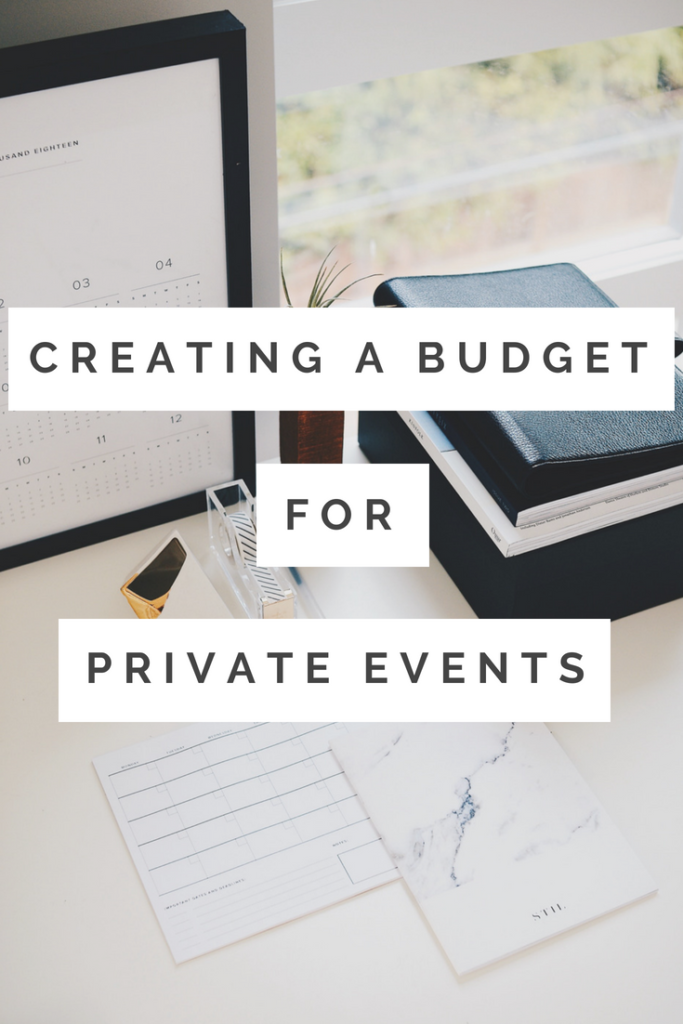
Do you have an event coming up that you need to start planning for? Whether it’s for a wedding, party, or corporate event, each one requires a budget. While many planners like to throw the best event of the year, many also want to save money while they are at it. Start your planning process off smoothly by creating a budget for your private event.
Where Do I Start?
First things, first – who is paying for the event? Answering this question before setting a budget is important as you need to know who is in charge of paying for what.
- Weddings
If it’s a wedding you are planning, are the bride’s parents paying for it? Are the groom’s parents chipping in? Or are you required to pay for most of your own wedding?
- Parties
Are you the only one involved in planning this party? If not, who can pay for what portion of the party? Split up cost responsibility by assigning catering, decorations, and party rentals to other people.
- Corporate Events
Find out what your responsibilities are for paying for your conference, meeting, or seminar. Is the company sponsoring the event or is it co-worker run? Make sure to delegate costs among all coworkers if the company is not responsible for the event.

How Much Will I Need?
Once you know who is paying for your event, you can then start to figure out how much money you will need. If other people are taking over certain expenses for your event, then you can start to plan out the different expenses you are responsible for.
Once you know your financial responsibilities, ask yourself if you have enough money or if you need to start saving. If you have enough money, great! If not, create a savings plan with realistic goals you can reach.
Example: Save $500.00 by December by putting $50.00 towards my event from each paycheck.
Creating a Budget Plan
Now that you know how much money you need to save, you can begin creating a budget plan for your event. Start thinking of areas where you can avoid hidden costs and items you can save money on.
Areas You Can Avoid Hidden Costs:
- Stick to your event time limit—going overtime may result in extra costs.
- Factor in vendor tips—don’t want to forget about those!
- Remember the little things—sometimes the smallest items like stamps, favors, or marriage licenses can be forgotten and can add up.
Areas to Save Money On:
- Cake—order a smaller display cake and have sheet cake available for cutting.
- Book an all-in-one venue— find a venue space that includes catering and set-up in one package cost.
- Cut Down Your Décor—keep it simple by choosing an inexpensive centerpiece, balloons, or tablecloths.
- Get Creative with Catering—host a potluck or hire a food truck to save on costs.
- Trim Your Guest List—fewer guests = fewer dollars spent on your event.
- Pass on add-ons—ask yourself if you really need the extras or if the base offering will do.
Areas that Need Budgeting:
Take some time to figure out which of the following areas need budgeting for your event. Write down costs expected for each one on a sheet of paper or download our free budgeting sheets below.
- Engagement Rings
- Wedding Rings
- Bridal Gown
- Party Dress
- Hair Accessories
- Shoes
- Jewelry
- Garter/Hosiery
- Groom’s Tux
- Groom’s Shoes
- Equipment Rental
- Decorations
- Lighting
- Balloons
- Gifts
- Venue Rental
- Catering
- Vendor Rental: DJs, Photographer, etc.
- Other
- Download our Wedding Budget Sheet
- Download our Event Budget Sheet

Commit to Your Budget
Now that you have listed out your expected expenses, commit to sticking to your budget. A well-planned event is planned by someone who sticks to their budget. We know you can do it—your event will be fantastic!

